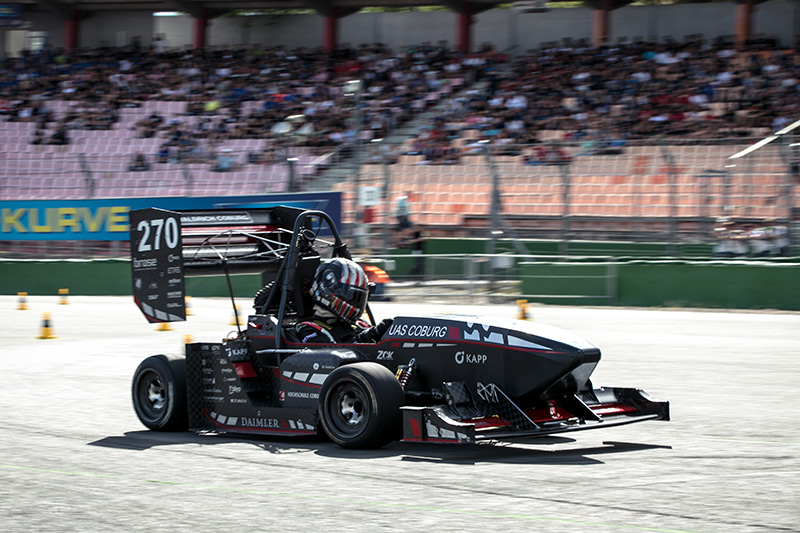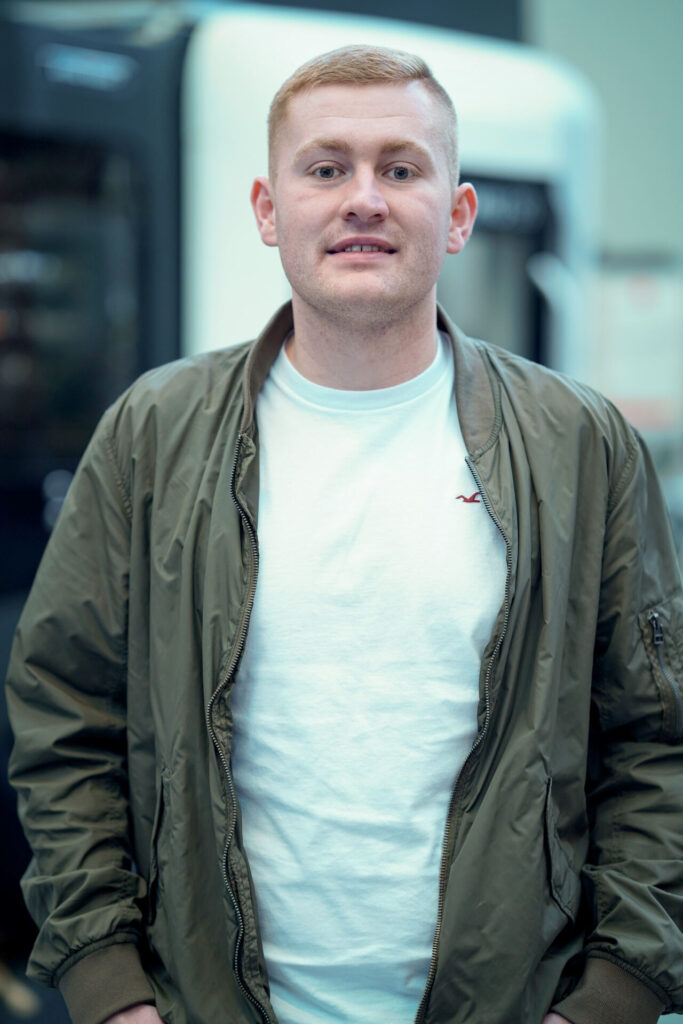Mechanical engineering – Digital production
At a glance
Academic degree
Bachelor of Engineering (B.Eng.)
Form of study
Full-time
Standard period of study
7 semesters (incl. practical semester), 210 ECTS
Place of study
Language of instruction
German
Start of studies
Winter and summer semester (October 01 and March 15 respectively)
Admission requirements
University entrance qualification, entrance qualification for universities of applied sciences, vocational qualification or foreign educational certificate
Orientation semester
Individual modules can be taken as part of an orientation semester
Semester abroad
Possible as a theoretical or practical semester
Studying with a practice partner
Accreditation
accredited by ACQUIN
Registration
02.05. – 30.09. (winter semester)
15.11 – 14.03 (summer semester)
Profile of the degree program
In the future, factories will be digital and networked and production processes and systems will become increasingly intelligent and automated. Production and IT are growing ever closer together. The “Digital Production” branch of study in the “Mechanical Engineering” degree program provides you with the necessary knowledge of modern production technologies and the intelligent control and monitoring of production processes. You will learn all about smart systems and new possibilities for process automation. At the same time, the course will enable you to manage processes in interdisciplinary teams of experts at the important interface between production and IT.
![]() During your studies, you will be optimally prepared to help shape the digital transformation in various sectors of the manufacturing industry and thus the future of production.
During your studies, you will be optimally prepared to help shape the digital transformation in various sectors of the manufacturing industry and thus the future of production.
Head of degree program
Course content and schedule
1st study section (basics)
In the “Digital Production” branch of the “Mechanical Engineering” degree program, you will learn the following basics in the first three theoretical semesters:
- Manufacturing and production technology
- Mathematics
- Mechanics and construction
- Project management
- Electrical engineering
- Computer science and programming
- Business administration
2nd study stage (specialization)
The second stage of your studies begins in the fourth semester. You can either complete your internship semester straight away or wait until the sixth semester. This allows you to design your course of study individually. You can also complete your internship semester abroad.
In the two theoretical semesters of the second study section (e.g. 4th and 5th semester or 5th and 6th semester) are about deepening your knowledge. Contents are for example:
- Digitalization in the value chain
- Networked production technology
- Production management
- IT systems in production
- Measurement technology and sensors
By choosing various compulsory elective modules , you can further shape your studies to a large extent according to your wishes. You can choose from the following subjects, for example:
- Artificial intelligence in production
- Robotics and handling technology
- CAD/CAM process chains
The Bachelor’s thesis can be written on site or in industry and is integrated into the 7th semester.
Practice during studies
Basic internship
Before the start of the practical semester, i.e. before your studies or during the first semester break, you will complete a 6-week basic internship in a company and gain your first practical insights into mechanical engineering. The basic internship can be waived in full or in part upon application, for example if you have a degree from a technical college or relevant vocational training. You can find more information in our information sheet on the basic internship. If you have any questions, please contact the relevant internship officer.
Practical semester
You can complete the practical semester in either the fourth or sixth semester. It comprises a continuous period of 20 weeks in a company. Here you can put your skills to the test in industry on an interesting project and make valuable contacts for your career.
You will also attend practical courses.
Studying with in-depth practice (PraxisPLUS)
Studying with in-depth practice (PraxisPLUS)
A degree course with in-depth practical experience (PraxisPLUS) offers the opportunity to gain up to 50 percent more practical experience during the course of your studies – without extending the duration of your studies. The prerequisite is a work contract with a company/institution. Students can apply their knowledge from the lecture directly at work. The work in the company is remunerated. This in turn makes it easier to finance their studies.
Cooperative study program (PraxisPLUS)
In the combined study program (PraxisPLUS), you combine the Bachelor’s degree with a suitable vocational training, for example a Bachelor’s degree in Automotive Technology with training as an automotive mechatronics technician.
This variant usually takes one year longer than the regular course of study, as you spend the first year exclusively in the training company and at the vocational school; you only start studying in the second year. From then on, you will spend the lecture period at the university and the lecture-free period as well as the practical semester in your training company. After 2.5 to 3 years, you will take the final examination for your apprenticeship, but will continue to work for your practice partner. You will also agree the topic of your Bachelor’s thesis with them. After 4.5 to 5 years, you will have a vocational training qualification and a Bachelor’s degree.
CAT-Racing

Students at the university design their own racing car to compete against teams from other universities in the “Formula Student” competition on international race tracks. CAT-Racing always achieves top placings. You too can become part of the team, prepare for your future career and, above all, have a lot of fun. Further information at www.cat-racing.de.
Study abroad
Coburg University of applied sciences and arts maintains relationships with numerous foreign partner universities. This gives you the opportunity to spend a study or internship semester abroad. Further information can be found at: Study abroad
Job & Career
Almost all manufacturing companies are in the midst of digital transformation. However, this requires not only computer scientists to provide the necessary software solutions, but above all well-trained mechanical engineers who bring important production and process knowledge to the central interfaces and at the same time master the basics of digitalization. With your degree in Digital Production in Mechanical Engineering, you will play a key role between production and IT. Managing projects and leading teams in the areas of production and planning are just as much a part of your day-to-day work as, for example, process and technology development, technical purchasing and sales and consulting for industrial companies.
Do another master's degree!
After successfully completing their Bachelor’s degree, good graduates have the opportunity to gain further qualifications with a Master’s degree. Coburg University of applied sciences and arts offers Master’s degree courses in Autonomous Driving, Additive Manufacturing & Lightweight Design and Development and Management in Mechanical and Automotive Engineering as well as other technical courses.
You can also find an overview of which Master’s degree programs you can combine with your Bachelor’s degree here.
Insights
You are currently viewing a placeholder content from YouTube. To access the actual content, click the button below. Please note that doing so will share data with third-party providers.
More InformationCurriculum and examination regulations
The module plan provides an overview of the structure of the degree program.
The module handbook provides information on the content of the individual modules. The study and examination regulations form the legal basis of the degree program. Questions about the content of the degree course will be answered by the course director Prof. Dr. Ingo Faber.
Study Ambassador

I’m Gabriel Folger and I’m a student ambassador for the Mechanical Engineering degree program. I study at Coburg University of applied sciences and arts myself and can answer your questions directly. So if you want to know what the degree program is all about or what it’s like to live in Coburg, just send me an email at gabriel.folger@stud.hs-coburg.de.


